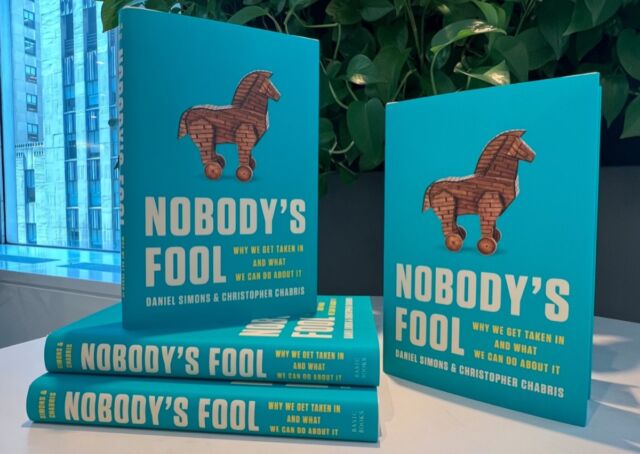Basic Books
There’s rarely time to write about every cool science-y story that comes our way. So this year, we’re once again running a special Twelve Days of Christmas series of posts, highlighting one science story that fell through the cracks in 2023, each day from December 25 through January 5. Today: A conversation with psychologists Daniel Simons and Christopher Chabris on the key habits of thinking and reasoning that may serve us well most of the time, but can make us vulnerable to being fooled.
It’s one of the most famous experiments in psychology. Back in 1999, Daniel Simons and Christopher Chabris conducted an experiment on inattentional blindness. They asked test subjects to watch a short video in which six people—half in white T-shirts, half in black ones—passed basketballs around. The subjects were asked to count the number of passes made by the people in white shirts. Halfway through the video, a person in a gorilla suit walked into the midst of the players and thumped their chest at the camera before strolling off-screen. What surprised the researchers was that fully half the test subjects were so busy counting the number of basketball passes that they never saw the gorilla.
The experiment became a viral sensation—helped by the amusing paper title, “Gorillas in Our Midst“—and snagged Simons and Chabris the 2004 Ig Nobel Psychology Prize. It also became the basis of their bestselling 2010 book, The Invisible Gorilla: How Our Intuitions Deceive Us. Thirteen years later, the two psychologists are back with their latest book, published last July, called Nobody’s Fool: Why We Get Taken In and What We Can Do About It. Simons and Chabris have penned an entertaining examination of key habits of thinking that usually serve us well but also make us vulnerable to cons and scams. They also offer some practical tools based on cognitive science to help us spot deceptions before being taken in.
“People love reading about cons, yet they keep happening,” Simons told Ars. “Why do they keep happening? What is it those cons are tapping into? Why do we not learn from reading about Theranos? We realized there was a set of cognitive principles that seemed to apply across all of the domains, from cheating in sports and chess to cheating in finance and biotech. That became our organizing theme.”
Ars spoke with Simons and Chabris to learn more.
Ars Technica: I was surprised to learn that people still fall for basic scams like the Nigerian Prince scam. It reminds me of Fox Mulder’s poster on The X-Files: “I want to believe.“
Daniel Simons: The Nigerian Prince scam is an interesting one because it’s been around forever. Its original form was in letters. Most people don’t get fooled by that one. The vast majority of people look at it and say, this thing is written in terrible grammar. It’s a mess. And why would anybody believe that they’re the one to recover this vast fortune? So there are some people who fall for it, but it’s a tiny percentage of people. I think it’s still illustrative because that one is obviously too good to be true for most people, but there’s some small subset of people for whom it’s just good enough. It’s just appealing enough to say, “Oh yeah, maybe I could become rich.”
There was a profile in the New Yorker of a clinical psychologist who fell for it. There are people who, for whatever reason, are either desperate or have the idea that they deserve to inherit a lot of money. But there are a lot of scams that are much less obvious than that one, selecting for the people who are most naive about it. I think the key insight there is that we tend to assume that only gullible people fall for this stuff. That is fundamentally wrong. We all fall for this stuff if it’s framed in the right way.
Christopher Chabris: I don’t think they’re necessarily people who always want to believe. I think it really depends on the situation. Some people might want to believe that they can strike it rich in crypto, but they would never fall for a Nigerian email or, for that matter, they might not fall for a traditional Ponzi scheme because they don’t believe in fiat money or the stock market. Going back to the Invisible Gorilla, one thing we noticed was a lot of people would ask us, “What’s the difference between the people who noticed the gorilla and the people who didn’t notice the gorilla?” The answer is, well, some of them happened to notice it and some of them didn’t. It’s not an IQ or personality test. So in the case of the Nigerian email, there might’ve been something going on in that guy’s life at that moment when he got that email that maybe led him to initially accept the premise as true, even though he knew it seemed kind of weird. Then, he got committed to the idea once he started interacting with these people.

Christopher Chabris
So one of our principles is commitment: the idea that if you accept something as true and you don’t question it anymore, then all kinds of bad decisions and bad outcomes can flow from that. So, if you somehow actually get convinced that these guys in Nigeria are real, that can explain the bad decisions you make after that. I think there’s a lot of unpredictableness about it. We all need to understand how these things work. We might think it sounds crazy and we would never fall for it, but we might if it was a different scam at a different time.